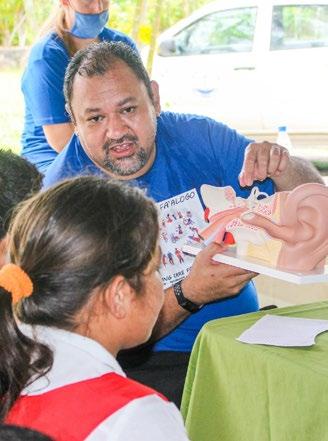
3 minute read
The Pacific Island Program – how are we doing?
Since 1995, the Royal Australasian College of Surgeons (RACS) has been working with health partners in Pacific island countries to improve access to surgical care through the Australian aid–funded Pacific Islands Program (PIP). PIP, now in Phase-V (2016-2021), aims to increase access to surgical care across 11 Pacific island countries by providing education and training to Pacific surgeons, nurses and other health workers and by supporting surgical teams to deliver surgeries locally. In May 2020, RACS Global Health commissioned a mid-term review of PIP (2016-2021) to identify opportunities to strengthen its ongoing implementation and impact.
Over a million people in Pacific island countries do not have access to essential surgery when they need it. RACS recognises that investing in people is essential to increasing access to health care in these countries and meeting the ongoing needs of Pacific communities.
Advertisement
To understand PIP’s performance and identify opportunities to ensure its success into the future, RACS commissioned a mid-term review of the program. The review included 35 interviews, and 79 online surveys with Australia- and Aotearoa New Zealandbased specialist medical volunteers, and Pacific stakeholders and healthcare workers.
The review found that PIP has delivered well against its mandate to support service delivery which would not otherwise have been available and to provide in-country training through on-the-job experience and the delivery of courses.
Between 2016 and 2019, RACS deployed 178 specialist medical volunteers (including surgeons, anaesthetists, specialist nurses and other healthcare workers) to provide training and mentoring to Pacific surgical and other healthcare workers via PIP. Accumulatively, through PIP, RACS specialist medical volunteers, in partnership with in-country clinical teams supported the delivery of more than 1700 surgical procedures. These occurred across eight Pacific island countries and 11 specialties. It also provided more than 1300 professional development opportunities for Pacific surgical healthcare workers.
Pacific surgeons were interviewed about their experiences participating in PIP. Many reported that they valued PIP highly for the clinical opportunities it provides. Almost 90 per cent of surgeons and other healthcare workers surveyed felt that their participation in PIP was ‘very’ or ‘extremely’ beneficial to their professional development. Many highlighted the importance of the professional support provided through PIP, which had increased their confidence and exposed them to development opportunities across a range of clinical and surgical specialities they would not otherwise have had.
“My confidence and courage to perform urgent life-saving operations have significantly increased from my involvement in PIP. It is important to have PIP volunteers continue to mentor, engage, enable, evaluate and audit the work that I do to support ENT in Samoa and the Pacific,” said Dr Sione Pifeleti, a Pacific Island Program participant and Otolaryngology Ear Nose and Throat (ENT) registrar in Samoa.
However, among the Pacific surgeons interviewed, there were also calls for PIP to support stronger reporting against competency frameworks, including formalised workforce development plans and Continued Professional Development (CPD). Other Pacific interview respondents felt there was work still to be done to improve PIP’s strategic alignment to Pacific surgical priorities.
Going forward, opportunities to ensure PIP’s ongoing impact, including those identified in the review, will be considered in consultation with Pacific and implementing partners as part of the design of the next phase of PIP.
RACS Global Health is committed to increasing the sustainability and relevance of PIP and supporting regional efforts to increase access to safe surgical care for Pacific communities.
The Pacific Islands Program is an Australian aid initiative implemented by the Royal Australasian College of Surgeons on behalf of the Australian government and delivered in partnership with the Pacific community, Ministries of Health, specialist colleges and associations, and partners.
If you are a health professional and interested in volunteering or supporting RACS Global Health please contact volunteer@surgeons.org









